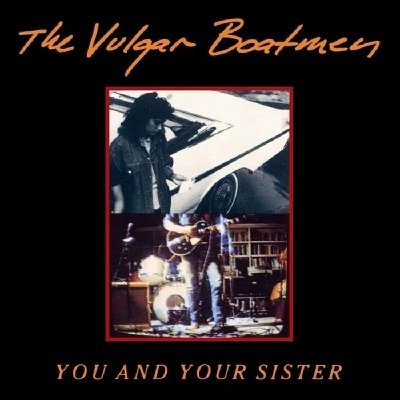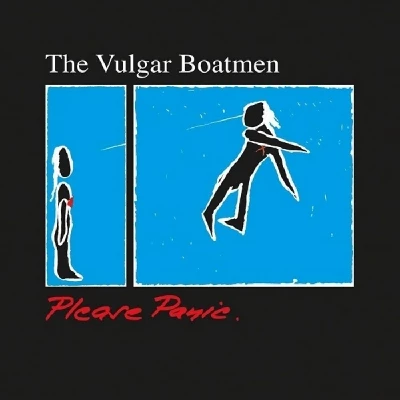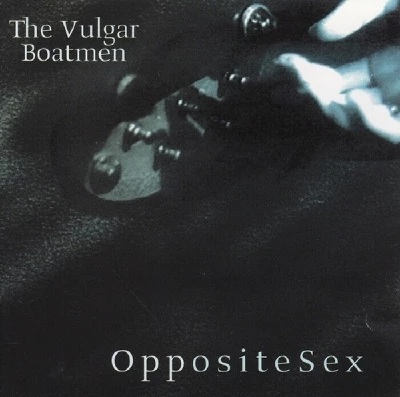published: 24 /
8 /
2018

Erick Mertz reflects on the musical career of cult American alternative rock band the Vulgar Boatmen, who have just had re-released three of their albums, 1989's 'You and Your Sister', 1992's 'Please Panic'and 1995's 'Opposite Sex' released on vinyl.
Article
The early 1980s are the shoulder season of rock music, arriving after the punk explosion and prior to grunge. Radio rock stars of the 1970s had already established and peaked, while the explosion of video was altering the landscape of becoming a star.
The early 80s was an era of pre and post and not quite. The Vulgar Boatmen may have come out of Gainesville, Florida, but they were born out of that unwieldy season.
The band’s recording aesthetic, at least early on in their history, was pure bedroom DIY. Their first two releases, 'Women and Boatmen First' and 'All Buds on Deck' were captured as cassette only, written and recorded by band members swapping tapes through the mail. One of those founding members, Robert Ray, was a University of Florida film professor and his primary partner in songwriting crime was a former student, Dale Lawrence who was back in Indiana dabbling in a proto-punk band, the Gizmos. Hardly the American rock and roll dream, the Vulgar Boatmen were a product of what was becoming a massive tape trading underground (think of the current mix-tape fad in hip hop, only with stamps). Eventually Ray and Lawrence morphed and fused their separate recording efforts, becoming the Vulgar Boatmen (the band’s name is a riff on a well-known Russian folk song, 'The Song of the Volga Boatmen'.
The earlier albums, evident by their progeny, are raw takes on what would become the band’s later masterworks, the three post-1989 albums which have just been re-released on vinyl. On 1989’s 'You and Your Sister', the band comes across somewhat sedate. Following an example set by their New Jersey contemporaries, the Feelies, this is their 'The Good Earth' album, which was a nice contrast to their thrills and pills debut set of jitters. On 'Change the World All Around' that battered mid-life sensibility makes for a nice, altruistic message, one of triumph and idealism that was on the air back then. 'rive Somewhere' strikes on a common Boatmen theme of well, driving somewhere and it delivers good energy. In places though, 'You and Your Sister' feels a tad bit tired. It is less forlorn than spent. On 'Hold Me Tight' the instrumentation treads in shallow water and washes out to sea.
The latter of the three albums, 1995’s 'The Opposite Sex' is the most comfortably down home. Ray and Lawrence know their influences and processes, arriving at something that approached commercial. The tracks lean more heavily on a steamy blues-infused country, with little touches of their characteristic grit. Some of the finest songs in the Boatmen catalogue come on this record, which makes sense, seeing how they were now thirteen years into their peculiar collaboration. On 'Opposite Sex' and 'Shake' their sound is summery and makes for a decent rooftop blast. One of my favorite tracks in this iteration is 'In a Minute' which leans on infectious hooks and feels inspired. Even the melancholy tracks on 'The Opposite Sex' are a notch up with 'Heartbeat' dispensing with lackadaisical drama, focusing instead on sincere lyrics and clean singing.
Eschewing the stigma attached to middle albums and middle movies (and those ornery middle children) 1992’s 'Please Panic' is the Boatmen at their peak. It is frenetic. It is jittery and uncomfortably spastic in places. It’s the weakest approximation of commercial radio rock, and so to wit, it is the best of bunch. The band seems to have captured a whole bunch of energy in an old beer bottle and channeled it through these twelve tracks. The opener, 'Don’t Mention It' is smart and biting alt-rock, while following a similar timing and rhythm, 'You Don’t Love Me Yet' is a different level take on love and sex and relationships. There is a bit more of a Velvet Underground/Lou Reed note on this record as it feels a lot like a band indulging in that feeling of coming apart at the seams (although more comfortably than the aforementioned legends).
Comparisons to REM are natural, in part because of their roots in the south. These comparisons though are, I think, to a large extent, overreaching. The Vulgar Boatmen are more contentedly at home with bands like the Feelies (and Pylon and Speed Through Plough) coming across as a heck of a lot less complicated than their Athenian contemporaries. It’s not a diminishing statement the Vulgar Boatman have bounced back to the rock party because of that simplicity and the sheer universality of their sound. These records are timeless. They are documents of rock and roll that scrambled out of an uneasy era and now seems at home in audiences in any time.
Band Links:-
https://en.wikipedia.org/wiki/The_Vulg
http://www.playloud.org/archiveandstor
Picture Gallery:-

